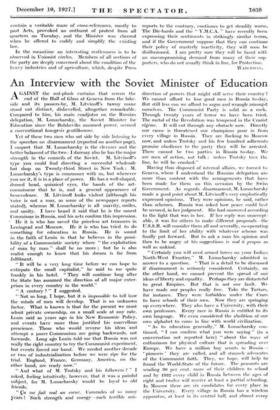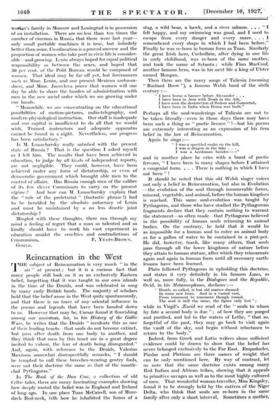An Interview with the Soviet Minister of Education A GAINST the
red-plush curtains that screen the end of the Hall of Glass at Geneva from the lake- side and its passers-by, M. Litvinoff's tawny mane stood out distinct, dishevelled, altogether remarkable. Ciunpared to him, his main coadjutor On the Russian delegation, M. Lunacharsky, the Soviet Minister for Education since the Bolsheviks assumed power, seemed a conventiOnal bourgeois gentilhomnte.
Yet of these two Men who sat side by side listening to the speeches on disarmament (reported on another page), I suspect that M. Lunacharsky is the cleverer and the better balanced of the two : I daresay also he has the major strength in the councils of the Soviet. M. Litvinoff's type you could find directing a successful Wholesale hat shop on Twenty-third Street in New York ; M. .Lunacharsky's type is commoner with us, but wherever you see it, it is in a place of power. Ile has a well-shaped, domed head, quizzical eyes, the hands of the art- connoisseur that he is, and a general appearance of benevolence. M. Litvinoff looks violent (although his 'voice is not a roar, as some of the newspaper reports stated), whereas M. Lunacharsky is all suavity, smiles, and sanity. I have heard it said that he is the sanest Commissar in Russia, and his acts confirm this impression.
He it is who has saved the priceless art treasures in Leningrad and Moscow. He it is who has tried to do something for education in Russia. He is sound in the faith of Lenin in that he believes in the possi- bility of a Communistic society where "the exploitation of man by man "shall be no more ; but he is also realist enough to "know that his dream is " far from fulfilment.
"It will be a very long time before we can hope to extirpate the small capitalist," he said to me quite frankly in his hotel. "They will continue long after the State has assumed the direction of all major enter- prises in every comitty in the world."
"A century ? " I suggested.
"Not so king, I hope, but it is impossible to tell how the minds of men will -develop. That is an unknown factor. What is known is that for the present we 'Mist admit private ownership, on a small scale at any rate. Lenin said so years ago in his New Economic Policy, and events have more than justified his marvellous prescience. Those who winild reverse " his ideas and attempt a purer Communism are going backwards, not forwards. Long aglo Lenin 'told me that Russia was not really the right Country to try the Cominunist experiment, Ind -events forced our hand. We needed another deeade or two of industrialization before we Were ripe for the trial. England, France, Germany, America, on the Other hand, are ready now."
"And what of M. Trotsky and his followers ? " I asked, feeling intuitively, 'however, that it was a p'ainful subject, for M. Lunacharsky would be loyal to old friends.'
"ça me fait mal au cacti'''. Comrades of so many rears! 'Such strength and energy--SUCh terrible mis- direction of powers that might still serve their country We cannot afford to lose good men in Russia to-day. But still less can we afford to argue and wrangle amongst ourselves. The Communist Party is solid as a rock.
Through twenty years of terror we have been tried. The metal of the Revolution was tempered in the Czarist regime. It will cut through any obstacle now. Directly our cause is threatened our champions pour in from every village in Russia. They are flocking to Moscow now, and unless Trotsky and his few hundred adherents promise obedience to the party they will be arrested. There cannot be two parties in Russia to-day. We are men of action, not talk : unless Trotsky toes the line, he will be crushed."
Having thus disposed of internal affairs, we turned to Geneva, where I understand the Russian delegation arc more than content with the arrangements that have been made for them on this occasion by the Swiss Government. As regards disarmament, M. Lunacharsky made a good point about M. Litvinoff's very emphatically expressed opinions. They were opinions, he said, rather than schemes. Russia was asked how peace could best be secured, in her judgment: She had answered according to the light that was in her. If her reply was unaccept- able, it was for others to make different proposals—the U.S.S.R. will consider them all and severally, co-operating to the limit of her ability with whatever scheme was finally put forward. But to ask a man his opinion and then to be angry at his suggestions is mai 9 propos as well as unkind.
"Certainly you will need armed forces on your Indian North-West Frontier," M. Lunacharsky admitted in answer to a question. "That is a detail to be discussed if disarmament is seriously considered. Certainly, on The other hand, we cannot prevent the spread of our ideas of liberty and equality. Perhaps they are distasteful to great Empires. But that is not our fault. We have made our 'peoples really free. Take the Tartars, for instance. They were forbidden under the Czars to have schools Of their Own. Now they are springing up everywhere. They also have a University, with their own professors. Every race in Russia is entitled to it own language. We even considered the abolition of our own alphabet to come in line with world civilization..
"As to education generally," M. Lunacharsky con- tinued, "I can confirm what you were saying" (in a conversation not reported here) "about the wave of enthusiasm for physical culture that is spreading over Europe. We have a million boy scouts in Russia- ' pioneers ' they are called, and all staunch advocates of the Communist faith. They, we hope, will help to found the World-State of the future. The peasants are sending 30 per cent. more of their Children to school and by 1632 every child in Russia between the ages of eight and twelve will receive at least a partial schooling. In 'Moscow there are six candidates for every place in the University. Every village in Russia has a wireless apparatus, at least in its central hail, and almost every worker's family in Moscow and Leningrad is in possession of an installation. There are no less than ten times the number of cinemas in Russia that there Were last year— only small portable machines it is true, but infinitely better than none. Co-education is a proved success and the proportion of women who take part in civic life is consider- able—and growing. Lenin always hoped for equal political responsibility as between the sexes, and hoped that 50 per cent. of the Polit Bureau would be composed of women. That ideal may be far off yet, but forerunners such as Mme. Lenin, and our present -Mexican ambassa- dress, and Mme. Jacovleva prove that women will one day be able to share the burden of administration with men in the new social order which we see growing under our hands.
"Meanwhile, we are concentrating on the educational possibilities of moon-pictures, radio-telegraphy, and modern physiological instruction. Our staff is inadequate and our capital is insufficient to do all that we would wish. Trained instructors and adequate apparatus cannot be found in a night. Nevertheless, our progress has been satisfactory."
Is M. Lunacharsky really satisfied with the present state of Russia ? That is the question I asked myself as I left him. The results that have been achieved in education, to judge by all ki:ads of independent reports, are not negligible. They could, however, have been achieved under any form of dictatorship, or even of democratic government which brought able men to the control of affairs. Has Russia enough men of the calibre of its few clever Commissars to carry on the present regime? And how can M. Lunacharsky explain that the "rule of the proletariat" (fantastic phrase !) had to be heralded by the absolute autocracy of Lenin and must be maintained by a no less drastic joint dictatorship?
Mingled with these thoughts, there ran through my mind a feeling of regret that a man so talented and so kindly should have to work his vast experiment in education amidst the cruelties and contradictions of











































 Previous page
Previous page